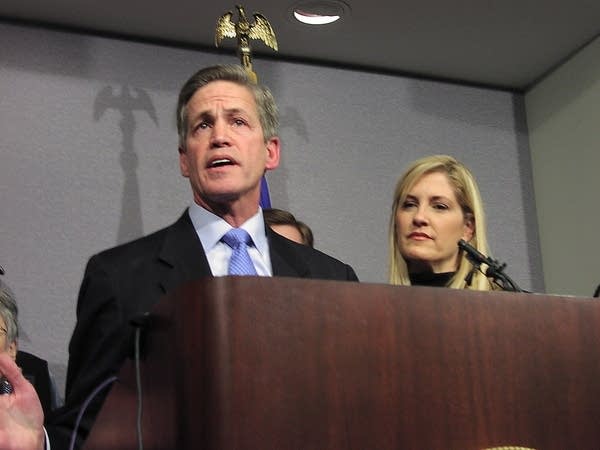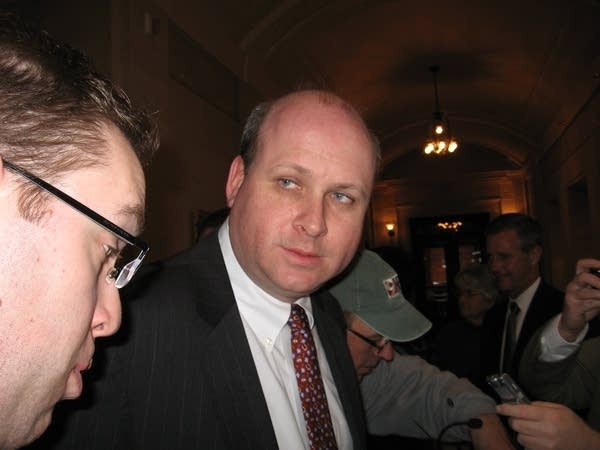Coleman's odds of winning shrink with new ballot tally
Go Deeper.
Create an account or log in to save stories.
Like this?
Thanks for liking this story! We have added it to a list of your favorite stories.
[image]
The three-judge panel hearing Coleman's election contest oversaw the counting of more than 350 previously rejected absentee ballots.
The judges did not release their final order in the case, leaving some claims still pending. But Coleman's lawyers renewed their vow to appeal to the state Supreme Court.

Today's counting of ballots in open court represented the first new votes added to the race since the recount ended in early January, and the atmosphere was thick with anticipation.
Turn Up Your Support
MPR News helps you turn down the noise and build shared understanding. Turn up your support for this public resource and keep trusted journalism accessible to all.
Spectators in the packed courtroom sat silent, and attorneys for the candidates were stoic -- all eyes fixed on a table in the center of the room. There, Minnesota's Director of Elections Gary Poser sat in front of several hundred ballots that he counted out, one by one.
After 45 minutes, Poser read the tally which showed that Norm Coleman had picked up another 111 votes, while Al Franken got an additional 198 votes. Other candidates received 42, for a total of 351.
Once the hearing was over, the courtroom masks came off. The differences between each side's attorneys looked like baseball teams after the last out in the World Series. The losers looked serious; the winners had wide grins.
Outside the court, Franken attorney Marc Elias even talked about how fine Coleman's legal team was. But he said his side came out ahead.

"I'm respectful of the high quality of lawyering that he had at this trial, and no doubt the best lawyers money can buy on appeal," said Elias. "But the idea that you have very good lawyers doesn't change the underlying fact. And the facts are that more Minnesotans voted for Al Franken than Norm Coleman, and nothing Norm Coleman can do in the courts is going to change that."
Coleman lawyer Ben Ginsberg said he's not surprised that Coleman came up short, because the panel only considered 400 ballots, and actually counted only 351.
Coleman's side wanted at least 1,300 ballots opened, and Ginsberg contends that most of those counted today came from Franken-leaning counties.
"What happened today in the sphere of this election is really inconsequential. What we've been saying is there's a much bigger pool of ballots that should be opened," said Ginsberg.
Since Nov. 4, Coleman has surrendered more than 1,000 net votes to Franken -- first as local officials reconciled their election night tabulations, then during the exhaustive hand recount where he lost the lead, and now through his court case.
"What happened today in the sphere of this election is really inconsequential."
Despite the count, Minnesota won't have a second senator any time soon.
Unlike the World Series, there's no finality to this score, only an appeal to another group of umpires -- the Minnesota Supreme Court.
Ginsberg says his side will appeal once the three-judge panel issues its final ruling, which could come sometime in the next week.
Ginsberg says Coleman will ask the justices to overturn the panel's mid-trial ruling, which found some ballots that were counted by the State Canvassing Board were illegal. Ginsberge contends that would open up at least another 4,000 ballots for consideration.
"In our best-case scenario, the Minnesota Supreme Court would ... tell the trial court to open up ballots consistent with the standards in place on Election Day," said Ginsberg.
Ginsberg argued that some counties allowed ballots of voters who substantially complied with the law, while others held voters to a tougher standard.

The court required absolute compliance, which Ginsberg said led to unequal treatment of ballots in violation of the constitution.
In rulings throughout the case, the judges stressed that absentee voting was a privilege, not a right, and therefore held to a higher standard in the interests of fraud prevention.
Secretary of State Mark Ritchie, a Democrat, said he would welcome an appeal, saying he thinks the state's highest court could provide closure. Ritchie added that once those justices rule, an election certificate should be issued.
Ritchie and Gov. Tim Pawlenty must both sign the election certificate which formally identifies the winner of the race. But the governor hasn't said for certain whether he will sign the certificate after the state Supreme Court rules.
Pawlenty has said if Coleman files another case in federal court, that court could prevent him from signing.
Coleman's side has 10 days to appeal its case once the three-judge panel issues its final ruling.
That ruling is expected to address several other Coleman claims, including whether to subtract 132 votes that disappeared from a Minneapolis precinct after Election Day.
Coleman also claimed poll workers made mistakes when making duplicate copies of damaged ballots. The error could have put both versions in the recount.
Even if the court agrees with Coleman on those ballots, it still wouldn't give him enough votes to overcome Franken's lead.
That's why Coleman's constitutional arguments present the best chance for Coleman to get more rejected absentee ballots included in the count, which he thinks would put him back in the game.


